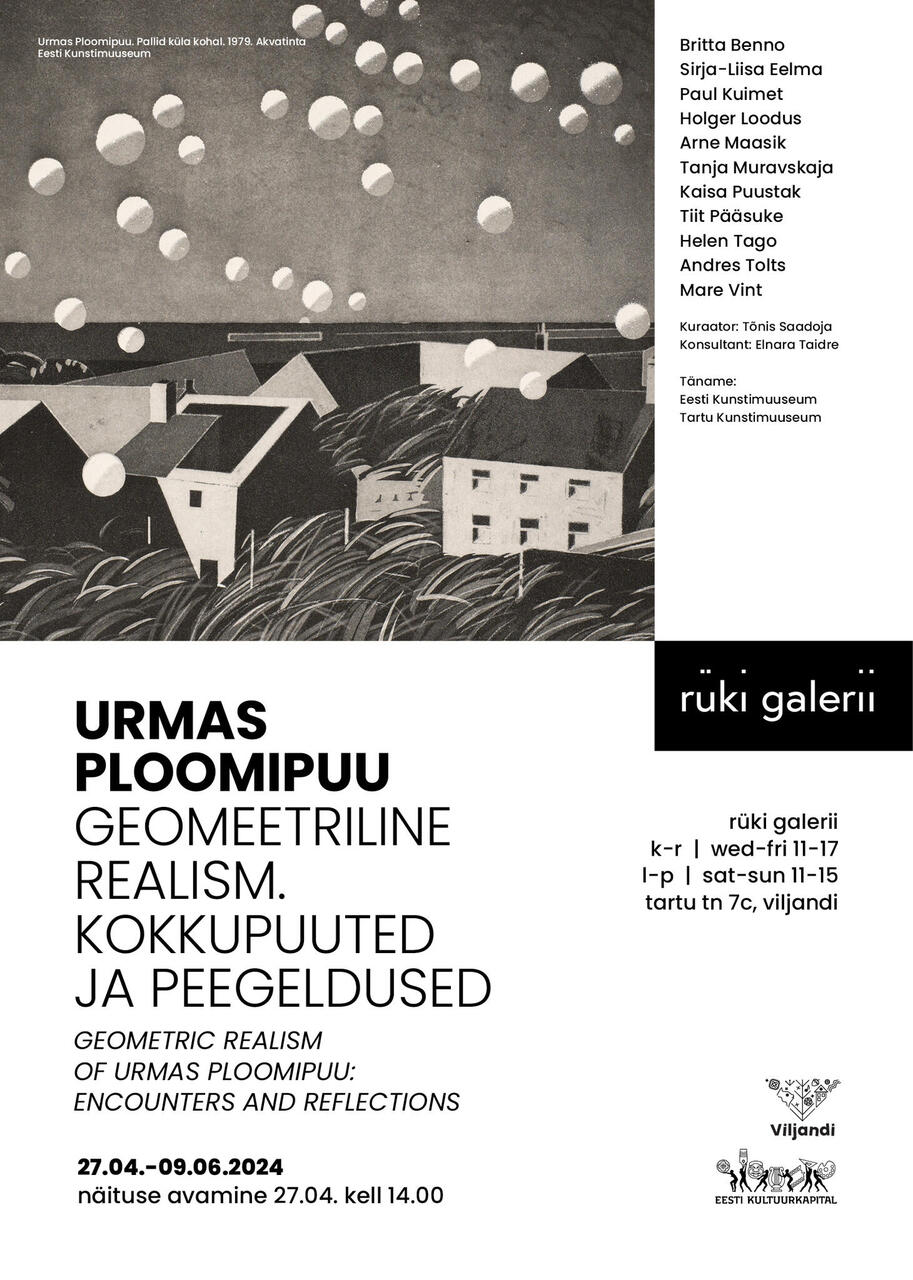"Geometric Realism of Urmas Ploomipuu: Encounters and Reflections"
On Saturday, 27 April at 2 p.m., the Rüki Gallery will hold the opening of an exhibition dedicated to Urmas Ploomipuu’s oeuvre, titled Geometric Realism of Urmas Ploomipuu: Encounters and Reflections. The curator of the exhibition is Tõnis Saadoja, the consultant Elnara Taidre.
The aim of the exhibition is to showcase the work of a remarkable, albeit little-known artist, Urmas Ploomipuu (1942–1990), in order to highlight the continued relevance of his oeuvre. Ploomipuu’s artwork is shown in dialogue with the works of some of his contemporaries as well as new renditions and homages created by the younger generation of artists. Ploomipuu’s unsurpassed technical mastery as a printmaker and painter as well as his skill in creating parables about our daily environment and its various elements speak to contemporary art and audience on several levels.
The focal part of the display consists of a dozen prints, which are Ploomipuu’s best-known works (which was quite unusual in Estonian graphic art in the 1970s). In addition to these classic pieces, the exhibition introduces some print proofs and previously unknown impressions from Laur Kivistik’s collection. Next to the prints, the audience can admire two oil paintings – Still Life with a Silver Pole (1984) and Still Life with a Bag (1984, Tartu Art Museum).
The actual emphasis of the exhibition, however, is on the visualisation of the reflections in and interactions of Ploomipuu’s oeuvre with the works of his contemporaries and present-day artists. Works by Kaisa Puustak, Mare Vint and Andres Tolts set the wider context of graphic art and painting in the 1970s and 80s, highlighting the empowering, estranged and even metaphysical potential of the image that is well-organised and has been liberated from the excess. The same approach is visible in the photography of Arne Maasik, embodied in the metaphysical dimensions of geometric shapes. The curator invited several younger authors, such as Britta Benno, Sirja-Liisa Eelma, Paul Kuimet, Holger Loodus, Tanja Muravskaja and Helen Tago, to interpret Ploomipuu’s legacy. The newly-created works feature these artists take on the various aspects of Ploomipuu’s art, like technical skill, the painterly qualities of printed images, (visual) poetry, playful imagery, and the potential of social impact of aesthetic images. Tiit Pääsuke, who studied at the art institute together with Ploomipuu, has created a new work of art based on a recollection of a prank from their common schooldays. While creating fascinating dialogues with Ploomipuu’s works, all the featured artists have remained true to themselves, keeping a fine balance between empathy and originality.
The exhibition at the Rüki Gallery is only the fourth solo show of Urmas Ploomipuu’s oeuvre, and all of the four shows have been held posthumously: in 1992 at the Draakoni Gallery, in the early 2000s at the gallery of the Bank of Estonia, and in 2011 in the Cabinet of Prints and Drawings of the Kumu Art Museum. The Kumu exhibition was accompanied by the monograph Urmas Ploomipuu valge maja (“Urmas Ploomipuu’s White House”), compiled by Tõnis Saadoja, which describes Ploomipuu as a renowned printmaker and phenomenal painter, whose four oil paintings are an outstanding technical and conceptual contribution to the chapter of Estonian photo realism of the 1980s.
As part of the exhibition, a talk with the curator and participating artists will be held on Saturday, 18 May at 3 p.m. The talk will be moderated by art historian and critic Andreas Trossek.
Participating artists: Urmas Ploomipuu, Britta Benno, Sirja-Liisa Eelma, Paul Kuimet, Holger Loodus, Arne Maasik, Tanja Muravskaja, Kaisa Puustak, Tiit Pääsuke, Helen Tago, Andres Tolts, Mare Vint
With the support of: Cultural Endowment of Estonia, Viljandi City Government
We thank: Art Museum of Estonia, Tartu Art Museum, Gristel Mänd, participating artists
The exhibition will remain open until 9 June 2024.

